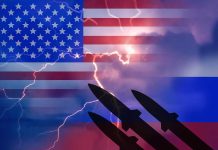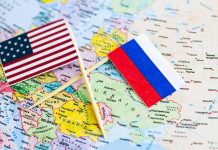
Secretary of State Marco Rubio delivered a stark ultimatum to Ukraine and Russia: make progress on peace talks within days, or the Trump administration is prepared to walk away from negotiations entirely.
Top Takeaways
- The Trump administration may abandon Ukraine-Russia peace efforts if significant progress isn’t made “within a matter of days,” according to Secretary of State Marco Rubio.
- A decisive meeting in London next week will determine whether the U.S. continues its involvement in peace negotiations.
- Rubio emphasized that the conflict is “not our war” and that America has “other priorities to focus on.”
- The U.S. and Ukraine are simultaneously working on a deal giving America access to Ukraine’s valuable mineral resources.
- President Trump has expressed frustration with both Ukrainian President Zelensky and Russian President Putin over the pace of negotiations.
Trump Administration’s Ultimatum
In a decisive shift from previous administration policies, Secretary of State Marco Rubio made it clear that President Trump’s patience with the Ukraine-Russia peace process is rapidly diminishing. Speaking to reporters after talks in Paris with Ukrainian and European officials, Rubio delivered a blunt assessment of the situation that signals a potential major policy change for the United States regarding the ongoing conflict. The message was unmistakable: progress must happen quickly, or America will redirect its attention elsewhere.
“We are now reaching a point where we need to decide whether this is even possible or not, Because if it’s not, then I think we’re just going to move on,” said Rubio, emphasizing America’s shifting priorities in the conflict.
Secretary of State Marco Rubio: "The Ukraine war is a terrible thing but it's not our war…The president has spent 87 days at the highest level of his government, repeatedly taking efforts to bring this war to an end. We are now reaching a point where we need to decide and… pic.twitter.com/ibwLh5Q950
— Mr Producer (@RichSementa) April 18, 2025
Days, Not Weeks
The Trump administration has established an unusually tight timeline for progress. Unlike previous diplomatic initiatives that often stretched into months or years of negotiations, Rubio stressed that they’re looking for immediate results. The Secretary’s statements reflect President Trump’s campaign promise to swiftly end the war in Ukraine, which he has repeatedly called “terrible and senseless” and claimed would never have occurred under his administration. A meeting scheduled in London this week is being treated as potentially decisive.
While Rubio characterized the Paris talks as constructive, with no rejections or walkouts from any parties, he made it clear that the administration’s patience is limited. His comments reveal a practical approach to diplomacy that contrasts sharply with the Biden administration’s more ideological stance regarding Russian intentions. This pragmatic shift reflects Trump’s campaign promises to focus on American interests first and avoid prolonged entanglements in foreign conflicts.
America’s Changing Priorities
The Trump administration’s position reflects a fundamental shift in how America views its role in the conflict. Unlike the previous administration that framed Russia’s invasion as an existential threat to democracy and NATO, Rubio clearly stated: “It’s not our war. We have other priorities to focus on.” This marks a return to Trump’s “America First” foreign policy that prioritizes direct U.S. interests over involvement in distant conflicts. The statement also suggests a broader reprioritization of American foreign policy objectives under Trump’s second term.
“If it’s not possible – if we’re so far apart that this is not going to happen – then I think the president’s probably at a point where he’s going to say, well, we’re done,” Rubio added. “We’ll do what we can on the margins. We’ll be ready to help whenever you’re ready to have peace. But we’re not going to continue with this endeavor for weeks and months on end.”
The Trump administration faces numerous competing priorities, including negotiating 75 trade deals in less than 90 days and addressing economic challenges at home. Even as peace talks continue, Russia has maintained its military pressure, with recent deadly strikes on Ukrainian cities including Sumy and Kharkiv that have caused civilian casualties. These ongoing attacks underscore the urgency of reaching a resolution but also raise questions about Russia’s sincerity in pursuing peace.
Mineral Resources and Strategic Interests
As peace negotiations unfold, a parallel economic agreement is taking shape that may provide insight into America’s strategic interests in the region. The U.S. and Ukraine are reportedly nearing a deal that would give American companies access to Ukraine’s valuable mineral resources, which are crucial for advanced technology manufacturing and reducing dependency on Chinese supply chains. This development suggests that while the Trump administration may step back from direct peace facilitation, economic engagement will likely continue.
Despite European concerns about Trump’s friendliness to Russia, the administration has maintained that European allies, including the UK, France, and Germany, are helpful partners in the negotiations. Vice President JD Vance has expressed optimism about ending the war during separate talks in Rome. Meanwhile, Russian presidential spokesman Dmitry Peskov acknowledged ongoing “complex negotiations” between Russia and the U.S., stating that Russia remains “open to dialogue” while seeking to secure its own interests.
For American voters who supported Trump’s promise to avoid endless foreign entanglements, Rubio’s statements signal that the administration intends to deliver on that commitment. If progress isn’t made quickly, the U.S. appears ready to step back and let European partners take a more prominent role in facilitating negotiations, focusing instead on America’s domestic priorities and more pressing international concerns.






















